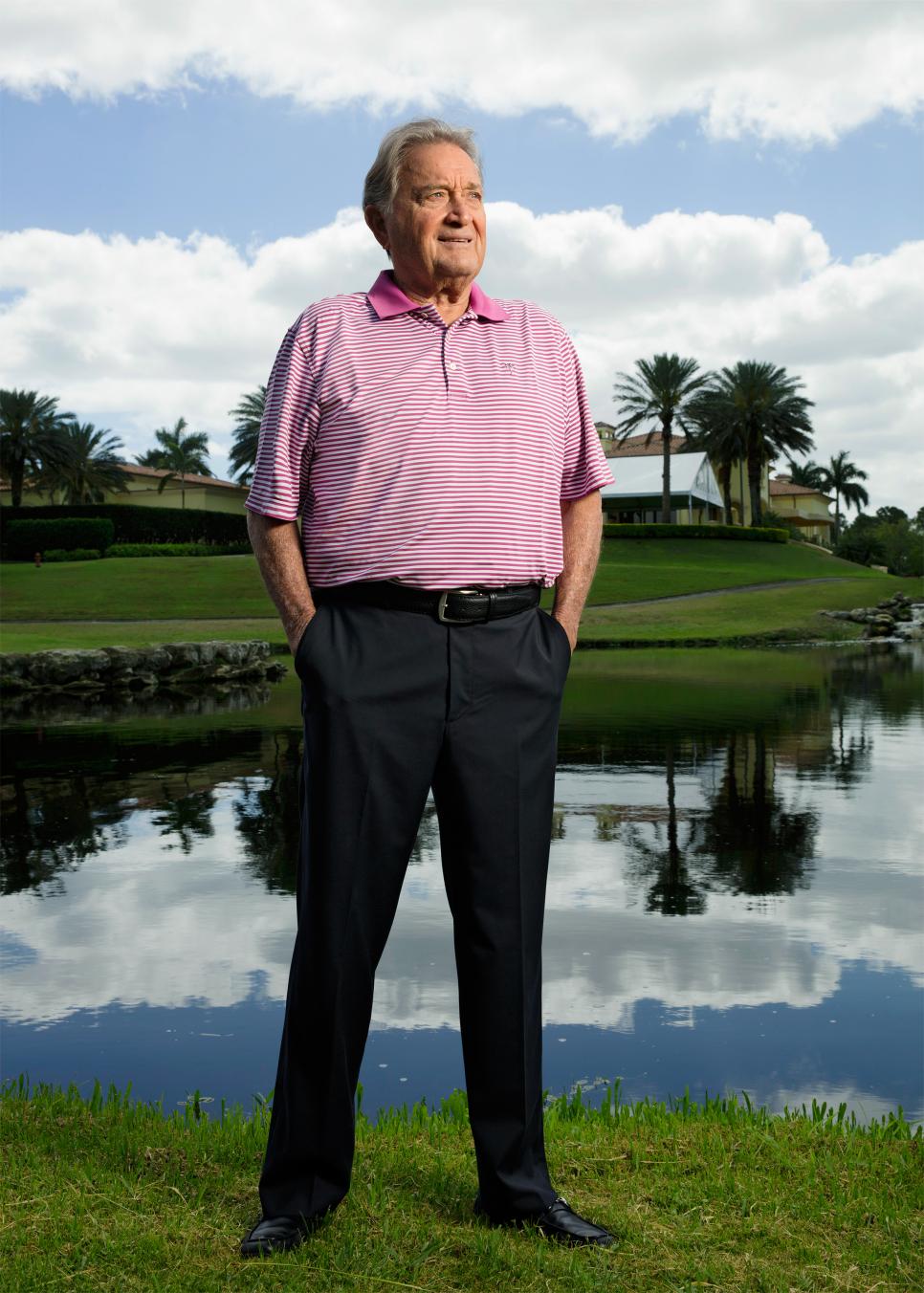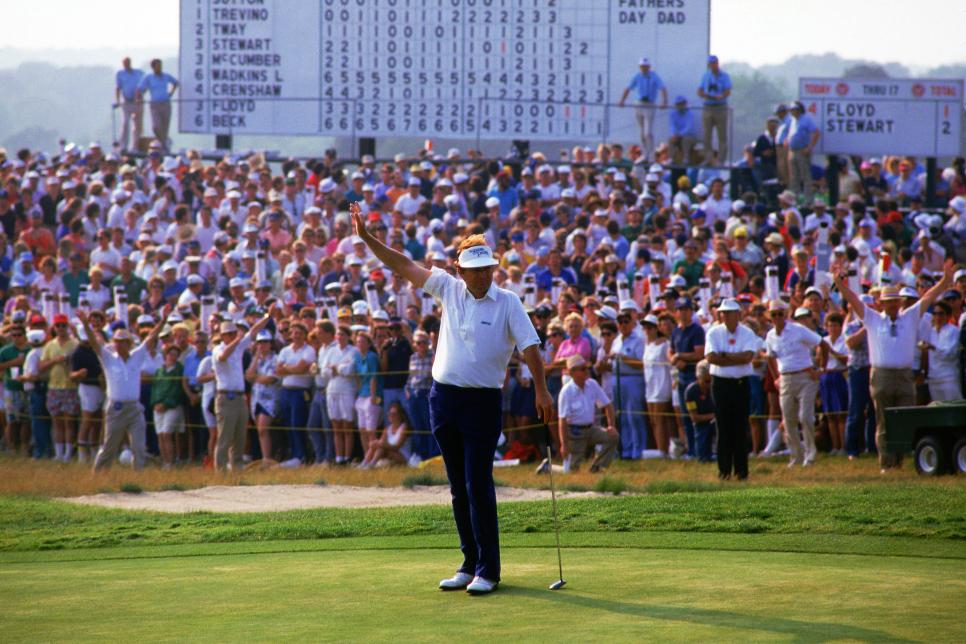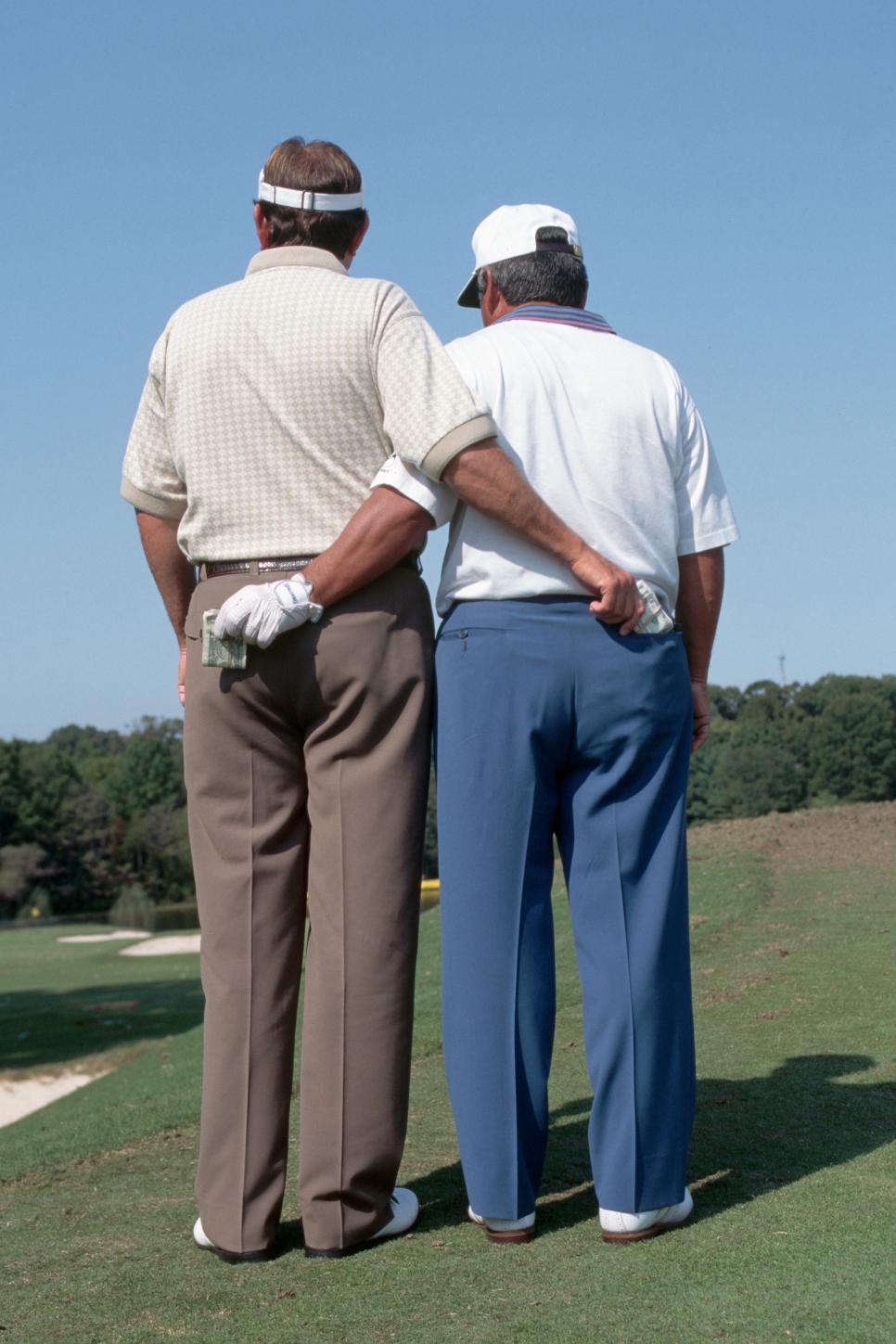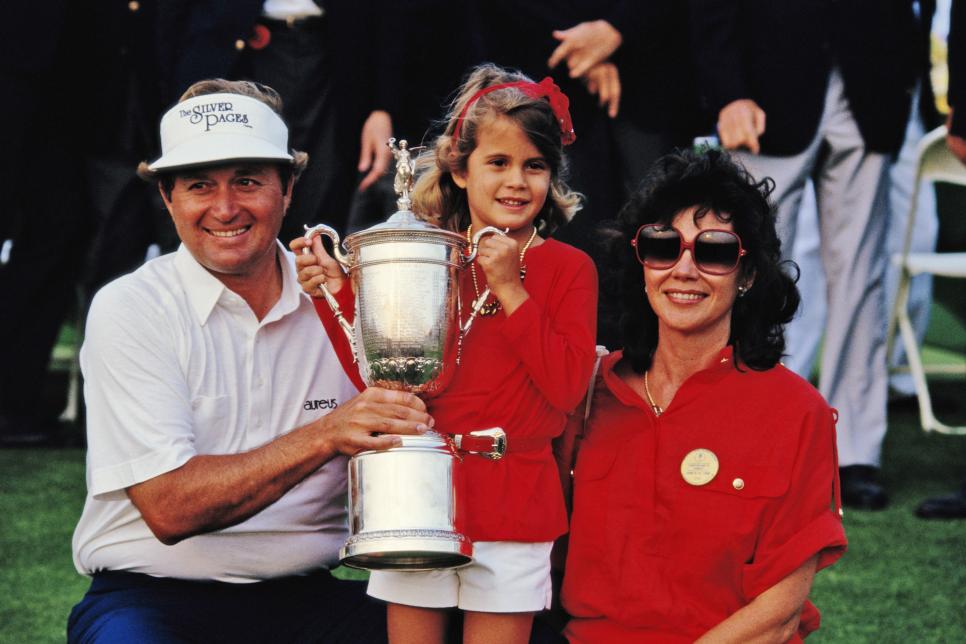News
My Shot: Raymond Floyd

What comes to mind when I think of the 1986 U.S. Open at Shinnecock? For one thing, the car ride over on the Sunday before the tournament started. Earlier that day, I'd lost at Westchester after sharing the 54-hole lead. All my career I was a good closer, but this time I played lousy and lost. It was a 2½-hour drive out to the end of Long Island, and it started out quiet. Then my wife, Maria, who until her passing in 2012 was my partner, my teammate, the love of my life and my everything, starts asking questions.
"So what happened today?" she said."It was just one of those things," I said. "I blew it. It happens." "Why did you blow it?" she said. I said, "Can we just forget about it and move on?" Maria said, "We're not going to forget it. We've got the U.S. Open this week. What if you're leading there? What are you going to do? I want to know why you just blew that tournament." I don't have a good answer. I'm fuming. It's silent for a while. But just as I start to cool off, Maria pours it on. "You never play well in the U.S. Open. What's the problem?" That did it. I stopped the car in the emergency lane of the Long Island Expressway, and we went at it.
As cars screamed past, Maria and I screamed at each other. Our three children and nanny were in the back seat, crying. It was awful. After we got underway again, I spent the rest of the drive doing some serious soul-searching. Which was what Maria had in mind to begin with.
● ● ●
MY U.S. OPEN "PROBLEM" was what the USGA did to the courses. The setups always seemed to take certain types of players out of the game. Oakmont in 1973, if you took one step off the green you were in rough above your ankles. That took good short-game players—players like me—out of the game. Pebble Beach in 1982, same thing and more, fairways choked off and other nonsense so it was no longer a links course. Winged Foot in 1974, forget it—it was impossible everywhere. Every year it was something, the USGA taking these magnificent courses and turning them into horrible versions of what they were meant to be. Going into 1986, my best in 21 tries was a tie for sixth. Bad setups and a bad attitude equals bad play.
● ● ●
NOBODY SEEMED TO KNOW ANYTHING about Shinnecock. It hadn't hosted a U.S. Open in 90 years. The morning after our adventure on the Long Island Expressway, I played a practice round with our kids tagging along. When we got back to the rental house, Maria asked, a little apprehensively, "So how do you like the course?" I said, "It's the best course I've ever seen in my life. It's so good, they couldn't mess it up." It was brutally difficult—the fairways narrow and the rough tall. But there wasn't a single gimmick. It didn't favor short hitters or long ones, high-ball hitters or low, draw-type players or faders. You could hit any club you wanted off the tees; an iron wasn't forced into your hands. At that U.S. Open, Greg Norman and Lee Trevino contended, and their playing styles were completely different. Shinnecock favors one type of player: a good one who's on his game. And I was playing well.
● ● ●
THE FIRST ROUND was the meanest weather I'd seen at a U.S. Open. When I teed off just after 8 a.m., it was cold, raining and the wind was blowing 40 miles per hour. Umbrellas were turning inside out. I hit five greens in regulation and shot a 75 that could have been 85. Bob Tway led with an even-par 70, which was phenomenal. You know how your mind wanders to unusual things in your life? When I look back at that round, I sometimes think of Dow Finsterwald.
Here's why. When I was 14 and growing up on the Army base at Fort Bragg, N.C., we'd play every day on the two courses there. My dad, L.B. Floyd, was head golf pro. Waiting to tee off, I looked over at the practice green and saw Dow Finsterwald, a playing pro who was serving his time in the military. Dow, who went on to win 11 tournaments, including the 1958 PGA Championship, was chipping from a big pile of shiny new Dunlop balls. When we made the turn, I noticed Dow was still there practicing his short game. And when we came off 18, he was still there chipping. It made a huge impression on me. From then on, I devoted 50 percent of my practice time to the short game, and it saved me countless times, most notably that first round at Shinnecock.
● ● ●
I HUNG AROUND and got closer to the lead. On Sunday, as I walked to the 10th tee, I looked in the gallery and saw Maria. She said later that when she saw the look on my face, she knew I was going to win. She called it The Stare, a focused expression that told her I was in the zone. It was an odd sensation. Everything was vivid. My step felt lighter. Watching myself on a USGA film recently, it looked like I was strutting. Every shot I faced felt like a foregone conclusion, like it had already happened and all I had to do was swing. It's such a wonderful feeling. When I birdied the 11th hole, I was briefly in a nine-way tie for the lead. Anything could have happened, but I felt like I was in control.

David Cannon/Getty Images
● ● ●
THE FELLOW FROM THE USGA who showed me that film kept pointing out that I missed a lot of very makable birdie putts. It's true. It reminded me how little stress I felt. When putts aren't falling, the tendency is to get a little exasperated. But it was like someone was patting me on the shoulder and saying, "Don't worry, you'll make some putts." And I did. On the day, I shot 66. I made no bogeys. That's hard to do.
● ● ●
AT FORT BRAGG, there weren't always kids around to play with, so I'd play with the enlisted men. There was a Sgt. Smith, a left-hander everyone called Smitty. As I grew up, it got to where Smitty couldn't beat me, so I started playing him left-handed with a rental set out of the shop. Pretty soon I was beating him that way, too. Poor Smitty. I took a lot of dimes and quarters from him.
● ● ●
GOLF WASN'T MY ONLY LOVE. I was a baseball pitcher. My dad had pitched some, and he brought me along. He'd catch me. I'd hit a spot low and away, and he'd say, "No good" and move his glove two inches. When I graduated from high school in 1960, the Cleveland Indians offered me a $25,000 signing bonus, which back then was substantial.
I passed—I was better at golf than baseball—but I loved keeping my hand in. In 1969, when I was still single and living in Chicago, I hung around the Cubs a lot and sometimes even threw batting practice. Ernie Banks, Billy Williams, Ron Santo, Fergie Jenkins, that was a hell of a team. Randy Hundley, the catcher, asked me to throw to him once so he could work out an issue with his timing. My fastball had a lot of movement, which annoyed Randy. "Throw it straight or I'll get somebody else," he said. "I can't help it," I said. So he got somebody else.
‘For places that have a no-tipping policy, do your best to ignore it.’
DURING A WESTERN OPEN one year, a buddy of mine from Cincinnati showed up. He was a huge horse bettor and had a lot of connections. "Come to the track with me this afternoon," he said. "There's a race that's as good as over. I know who's going to win." So I went with him to Hawthorne Race Course. He handed me a program and said, "Look for Tangohoochie. That's who we're betting on." I looked and told him I didn't see a horse by that name. He said, "Tangohoochie isn't the name of the horse, it's the name of the jockey." We found the horse with Tangohoochie aboard, waited at the betting window until the last minute, then put down a bundle at 20-1. Our horse won by eight lengths. The owners didn't show up to claim him. When they did the mandatory urine testing, they found the horse loaded to the ears with drugs. As for Tangohoochie, he got sat down for using an electrical shocking device.
● ● ●
GUYS LIKE MY CINCINNATI BUDDY were hangout people more than close friends. In Las Vegas, I had great relationships with Moe Dalitz, Lou Rosanova, Ash Resnick and men like them. They knew what I did for a living, but I didn't need or want to know everything they did. Most of the important people in the old Las Vegas were reputed to have mob ties. I knew they weren't exactly Emily Post. But one-on-one, they were smart, decent, well-mannered and fun to be with.
● ● ●
HERE'S THE LEE TREVINO GAMBLING story again, with a little more detail. In 1965, I was coming off a win at the St. Paul Open and had gone down to Tenison Park in Dallas for a little action. As I played, I noticed this old man watching in the background. It was Titanic Thompson, the legendary gambler. He introduced himself and said, "You ought to quit the tour and come with me. You can make a lot more money in the games I'll set up than you'll ever make in those tournaments." I told him I was honored but that playing the PGA Tour was all I'd wanted to do my whole life. Then he said, "Have you heard of a guy from around here named Lee Trevino?" I said I hadn't. Titanic said, "Pretty good player. He used to work on the driving range here. He's over in El Paso now. How would you like to play him for a lot of money?" I told him I'd play anybody I'd never heard of for money, anywhere.

Tony Roberts
Two days later, I'm in El Paso. The stakes were arranged. I'd put up $1,000 of my money. Titanic and the guy who drove me out there put up $1,000 apiece, so all together there's $3,000 at stake. It would be a single 18-hole bet, medal play walk-in. No presses, just a straight bet, low score wins. Trevino didn't put up anything. He had backers and would get a percentage if he won.
The first day, I shot 65, and he shot 63. I was down $1,000. The course, Horizon Hills, was hard as a rock with a greenside bunker maybe every other hole and no fairway bunkers at all. Lee really knew that course. I wanted to play him again. The next day I shot 64, and he shot 63. Now I'm down $2,000. I said, "I want him again." The guy who took me out there pleaded, "Let's go over to El Paso Country Club. That's a better course for you." I said, "No, I've never been there before. I'm getting to know this course. I know I can take him."
The third day, we play for $2,000, double or nothing. We're tied coming to 18. I can see it like it was yesterday. It was a par 5, and we're both on in two. He's 20 feet away, and I'm 18 feet. When he hit his putt, it's not halfway to the hole when I thought, It's in. It just had that look. It hits the hole, spins more than 300 degrees and sits on the edge. If you know common Bermuda greens, you know balls never stay on the edge. Invariably they fall in. Trevino went up to the hole and waited a little longer than the stipulated time. He put his shadow over the putt to make the grass lie down so the ball would drop. The whole time I'm reading my putt, knowing his ball would fall. But somehow it stayed on the edge.
Now I've got an 18-footer to win. I hit that putt and drilled it dead center. It would have gone in a thimble. I was back to even for the three days. After I picked my ball out of the hole, I spoke Spanish for the first time. "Adios," I said.
With that, when Lee came on tour, I honestly didn't think he'd make it. He couldn't hit the ball high enough to clear a one-story clubhouse. He could move the ball incredibly well, but I saw problems in store with elevated greens and deep bunkers. Needless to say, he adapted. I was wrong.
‘If I saw Madoff today, I’m not sure what I’d do. Punch him in the face, maybe.’
WHEN I BEGAN INVESTING WITH BERNIE MADOFF, some close friends around Palm Beach, hedge fund and finance people, warned me to be careful. "Nobody knows what this guy does or how he does it," they said. "If you decide to go with him, don't invest a lot." My son Raymond Jr. is an equities trader in Connecticut. He told me, "Dad, you can't put money with this guy. You never do that if you don't even know what he does."
I invested anyway. Madoff lived seven or eight houses down from me. The returns were excellent. Not insane, but steady. Moreover, he was like a bank. You could withdraw at any time. For six or seven years, I did very well with him. Eventually I met Bernie. Had lunch with him on my boat with some other people. He seemed like a sweetheart, and his wife was incredible. Then it ended. Overnight, everything I had with him was gone. I took a huge hit, but I also was very fortunate. The returns I made with him over the years mostly compensated for the one big loss, so that on balance I wound up close to even. Many people not only lost what they had invested but had to provide restitution for what they'd made in the past. That's where the most serious tragedies were. If I saw Madoff today, I'm not sure what I'd do. Punch him in the face, maybe. What else could I do? He was a thief and a criminal.
● ● ●
TAKE A SMALL-TOWN KID from North Carolina, drop him overnight onto the PGA Tour and glamorous places like Los Angeles and Las Vegas, and he's going to want to live a little. I was single, moderately successful and eager to soak it all in. Racetracks, nightclubs, sporting events—I wanted to experience it all. I ran with Joe Namath and Paul Hornung. The Rat Pack guys, like Dean Martin, who was a good friend and great guy. Clint Eastwood and I ended up playing together in 23 Pebble Beach Pro-Ams. You learn a lot being around people like that. How to dress, get a good restaurant table, who to tip, and how much. How to earn and maintain friendships. And most of all, how to enjoy life.
● ● ●
HERE'S WHAT I LEARNED ABOUT TIPPING. First, there's no such thing as overtipping. That's a myth. Tip at the limit of what you can afford, keeping in mind that valets and maître d' will sense immediately if you're sincere about trying to take care of them, which is the most important thing. Second, prepare your tips in advance. Fold a few bills neatly so they can be pressed into a palm on short notice. Learn to do it during a handshake; it's not hard. Never show off, and never put the person on the spot. Next, if you're at a golf club, always tip the caddiemaster, because he's the one who makes things happen. Before Augusta National permitted us to bring our caddies, I made a point of taking care of the caddiemaster, the late Freddie Bennett. Magical things happened as a result. For places that have a no-tipping policy, do your best to ignore it, though you didn't hear it from me. Finally, for the people who don't customarily receive tips, drop them a card at the end of the year with something inside they'll appreciate.
● ● ●
I'M AT THE HOUSTON OPEN, early 1960s. On the first day, first hole, first shot, the guy I was playing with ricocheted his ball off a tree and into a swamp. Lost ball. Except that when we get up there, the guy, who shall remain nameless because it was more than 50 years ago and you wouldn't remember him anyway, says, "Got it! Here it is!" and points down to a ball in the rough. I said, "There's no way that's your ball. I watched it go into the swamp." Even the marshal standing there agreed with me, but the guy said, "No, this is my ball. See the markings?" The ball in the rough had his unique markings, but I wasn't buying it. I then asked him a very simple question: "If that's your ball and it's your first shot of the day, where are the other two from the sleeve?" The guy turned bright red and started stammering, guilt everywhere. He was caught. But he stuck to his story. When I called in a tour official to try to protect the rest of the field, the official said, "I'm sorry, but we have to side with the player."
● ● ●
MY HERO WAS ARNOLD PALMER. When I came on tour, any question I had on an important matter, personal or professional, I'd take it to Arnold, and he'd advise me like an older brother. At the 1965 Masters, I showed up in a pair of madras pants. They were the "in" thing, and I thought they looked sharp as could be, but Arnold came over to me in the locker room and said, "That just isn't the right look for here." I thanked him and then changed. I loved that guy.
● ● ●
ONLY MARIA KNEW THIS ABOUT ME, and I've kept it quiet until now, but the truth is, I never enjoyed the crowds. And I didn't like interacting with the media, which I felt were dishonest. One thing I didn't mind was pro-ams. I really liked helping amateurs and always followed up with letters, because it was vital to the tour. But the other stuff irritated me, and after 50 years of doing the same dance every week, I was glad when it ended. I like being alone. I'm one of those people who can be alone but not lonely. Today I fish, hunt quail and bow-hunt deer with a very small circle of friends. Every two weeks, I take my boat down to the Bahamas, where it's just me, my girlfriend, Jennifer, and the fish. The solitude and private life are what I worked for all those years.

Brian Morgan/Getty Images
● ● ●
MY FIRST MAJOR VICTORY was the 1969 PGA Championship. All week, protesters had been using Gary Player as a springboard to demonstrate against apartheid in South Africa. On Saturday, as Gary and Jack Nicklaus were preparing to putt on the 10th green, a guy burst from behind the ropes and charged across the green. Unfortunately for him, Jack was standing between him and Gary. From the 10th fairway, I watched Jack raise his putter with both hands, like he was ready to cold-cock the guy. The sight of Jack apparently gave the guy second thoughts, because he went to the ground with a second-base slide. Security was on him within seconds. The amazing thing was Gary's play that week. Amid all the chaos—people had thrown ice in his face and heckled him unmercifully—he finished one shot behind me.
● ● ●
I DIDN'T BELIEVE IN DESTINY until Ken Venturi won the 1964 U.S. Open. I was paired with him for the final 36 holes, and how he finished, I'll never know. It was the hottest day I've ever seen. Even people sitting down in the gallery were passing out. By the end of the morning round, Ken was in bad shape. In the afternoon, toward the end, he didn't know where he was. Part of the miracle was how he kept hitting the ball flush and pretty long, too. When he holed the final putt and I picked the ball out of the hole for him—he was too dazed and exhausted to do it—I had tears in my eyes. Some things are just meant to be.
● ● ●
MY SECOND PGA CHAMPIONSHIP came at Southern Hills in 1982. We all have little personal feats we're secretly proud of, trivia we might tell our friends over a drink. My favorite happened that year during the first round, when I shot 63. Starting at the sixth hole, I made nine consecutive 3s. I don't think anyone else has done that in a major. Some of the big accomplishments, people have to wring out of me. But that one, I brag about.
● ● ●
GOING INTO THE 1976 MASTERS, my record there was mostly lousy. The problem was the par 5s. I couldn't hold the greens with my 3-wood or 1-iron when I went for them in two. Not many players could, because this was before the distance explosion. The greens were sand-based Bermuda, harder than your head, and hard to hold. At the 15th, the big danger wasn't the water short, it was the water long. The ball would hit the green, take a huge bounce and go into the pond at 16. I made a ridiculous number of double bogeys that way. I needed a club that would hit the ball higher. I went to a clubmaker named Bert Dargie and asked if he had any 5-wood clubheads. "Nobody makes 5-woods for men," he said. "I have some we make for women." I took five of them back to Florida and worked on them. Two of them broke when I hit them. But I finally got one just right, and it became an amazing weapon at Augusta. I just tore up the par 5s, played them in 14 under. I shot 17 under and tied Nicklaus' record of 271.
● ● ●
THE LAST ROUND I played was at Shinnecock Hills last September. I'm a member, and we played the member tees. It was not exactly a replay of 1986, and there were a lot of reminders that I'm 75 years old. I'd miss a shot short, leaving myself the easiest pitch-and-run you've ever seen. I'd chunk that one, then giggle and move along, enjoying the day with friends. Nothing about my game is the same. But I did shoot 72 that day. I might even have won a few bets.